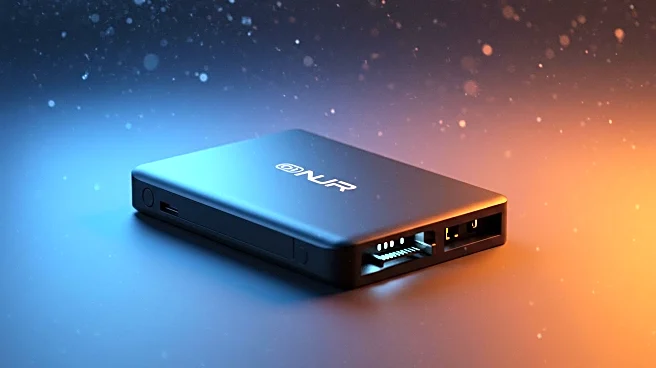What's Happening?
Biwin, a prominent player in the memory and storage industry, has unveiled a new type of SSD called the 'Mini SSD'. This innovative storage solution is significantly smaller than traditional SSDs, measuring just 15 x 17 x 1.4 mm. Despite its compact size, the Mini SSD offers impressive storage capacities ranging from 512 GB to 2 TB, with read speeds up to 3,700 MB/s and write speeds up to 3,400 MB/s. Additionally, the Mini SSD is IP68-rated, making it dust-tight and capable of being submerged in water up to one meter deep. It also features internal shock-proofing, allowing it to withstand drops from up to three meters. However, the adoption of this technology may face challenges as it requires proprietary sockets in devices, which could limit its immediate integration into the current market dominated by MicroSD cards.
Why It's Important?
The introduction of Biwin's Mini SSD could significantly impact the mobile device industry by offering faster and more durable storage solutions compared to existing MicroSD cards. This advancement is particularly relevant for gaming devices, where speed and reliability are crucial. The Mini SSD's potential to outperform MicroSD cards in benchmarks could drive demand for devices that support this new format. However, widespread adoption will depend on device manufacturers' willingness to incorporate proprietary sockets for the Mini SSD, which could be a barrier given the established use of MicroSD cards. If successful, this technology could lead to a shift in storage standards within the industry, benefiting consumers with enhanced performance and durability.
What's Next?
For the Mini SSD to gain traction, major device manufacturers will need to adopt the proprietary socket required for its use. Currently, only a few devices, such as the Strix Halo-powered GPD Win 5 and the OneXPlayer SuperX laptop/tablet hybrid, are reported to support the Mini SSD. As Biwin is a large manufacturer, it may have the influence to encourage more companies to integrate this technology. The success of the Mini SSD will depend on its acceptance by the broader market, which could take time given the competitive nature of the tech industry. If more manufacturers embrace this innovation, it could lead to a new standard in mobile device storage.










